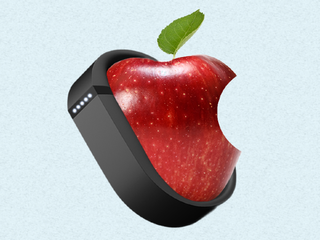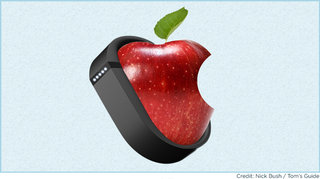5 Reasons Why Apple Should Buy Fitbit
Apple should buy Fitbit in order to bring more customers into its ecosystem while gaining more expertise in health and fitness.


Now that Fitbit has filed for a $100 million IPO, some in the industry are claiming that it's a defensive move, that the company is trying to raise capital to avoid being crushed by Apple. That may be true, but it's Apple that should be making a move, swooping in to scoop up Fitbit as it approaches $1 billion in revenue.
While many believe that stand-alone fitness trackers will go the way of dedicated e-readers, I don't agree. The public will continue to have an appetite for more-accessible health-tracking devices, and Fitbit's portfolio can complement the Apple Watch. It will allow Apple to bring more customers into its ecosystem while gaining more expertise in health and fitness.
Here's why Apple should buy Fitbit.
Affordable Apple Watch Alternatives ... from Apple
The biggest complaint that most people have about the Apple Watch, sight unseen, is that it's too pricey for what it does. Fitbit's offerings start at just $60 for the Zip, which does basic fitness tracking. "You could look at it as an Apple Watch Shuffle," said Avi Greengart, research director for consumer platforms and devices at Current Analysis.
The Fitbit line goes all the way up to $249 for the Fitbit Surge, which adds notifications, music control and GPS tracking (something the Apple Watch lacks). Even Fitbit's priciest product is $100 less than the Apple Watch. "Apple does like hitting lots of price points," Greengart added. "They could see it as a continuum."
Accelerating Apple Pay Adoption
Apple Pay has been gaining serious momentum lately, with Best Buy deciding to adopt the mobile-payment service and Home Depot announcing that it's going to roll Apple Pay out in 2,000 stores. With Fitbit, Apple can reach a much wider audience of wearable-device owners by integrating NFC on the $99 Fitbit Flex and other, more-premium products. If it works like it does on the Apple Watch, you'll just need to double tap a button, then tap your wrist to the terminal.
The more people there are with access to Apple Pay, the more likely it is that businesses that are on the fence about the solution will adopt it.
Apple Gets More Fitness-App Expertise
So far I'm not impressed with Apple's Health and Activity apps, which are essentially different types of dashboards. Like the Apple Watch, Fitbit gives you awards for meeting goals, but it goes a step further by letting you compete with friends and share stats. You can also direct-message each other.
Plus, Apple Health doesn't currently let you track your diet directly. Fitbit does, enabling users to log calories and leverage a barcode scanner for scanning items. "If Apple were going to acquire Fitbit, they would want to collect data around health," Greengart said.
MORE: Best Fitness Trackers
Fitbit Is a Profitable Leader
Fitbit is the rare tech company that's going public as profitable, having ended 2014 with $745 million in revenue. It also moved more than 10 million devices in 2014. Market research firm NPD says that Fitbit leads the fitness-tracking category by a wide margin. In fact, Fitbit garnered 68 percent market share in 2014, up 10 percent from the year before. Apple could go down-market, but Fitbit would give the company a shortcut.
The Beats Precedent
Apple has shown that it isn't afraid to acquire consumer electronics companies. It spent $3 billion to purchase Beats headphones and the Beats music service, which is expected to be relaunched this summer to go head to head with Spotify. But Greengart said Apple was just as interested in Beats' people — Jimmy Iovine and Dr. Dre — as the company's technology. "With Beats, it was the world's most expensive acqui-hire." Nevertheless, Beats sales haven't seemed to skip a beat, and neither should Fitbit's. In fact, there would likely be a boost because of the Apple halo effect.
Could It Happen?
"Is it crazy? No. Is it likely? No," Greengart said of Apple acquiring Fitbit. As the analyst points out, if Apple were truly interested in Fitbit, it probably would have made a bid for the company before it filed for an IPO. And if Apple wanted to offer lower-cost fitness devices, it could just build its own.
But based on Fitbit's market position, unique strengths and ability to feed Apple a lot more health data more quickly — not to mention on-ramp more shoppers to the more-premium Apple Watch — I believe it makes sense for Apple to make a move.
Follow Mark Spoonauer at @mspoonauer. Follow Tom's Guide at @tomsguide, on Facebook and on Google+.
Sign up to get the BEST of Tom’s Guide direct to your inbox.
Upgrade your life with a daily dose of the biggest tech news, lifestyle hacks and our curated analysis. Be the first to know about cutting-edge gadgets and the hottest deals.
Mark Spoonauer is the global editor in chief of Tom's Guide and has covered technology for over 20 years. In addition to overseeing the direction of Tom's Guide, Mark specializes in covering all things mobile, having reviewed dozens of smartphones and other gadgets. He has spoken at key industry events and appears regularly on TV to discuss the latest trends, including Cheddar, Fox Business and other outlets. Mark was previously editor in chief of Laptop Mag, and his work has appeared in Wired, Popular Science and Inc. Follow him on Twitter at @mspoonauer.

